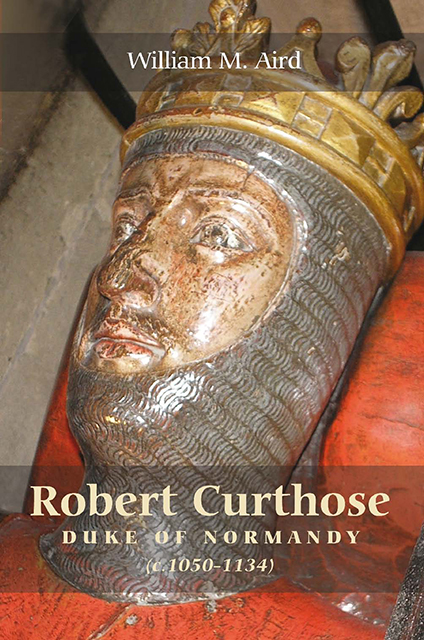Book contents
- Frontmatter
- Contents
- Dedication
- Acknowledgements
- Abbreviations
- Maps
- Genealogy: The Family Connections of Robert Curthose
- Introduction
- Chapter One Childhood
- Chapter Two The Dutiful Son
- Chapter Three The King's Son
- Chapter Four The Duke of Normandy, 1087–1096
- Chapter Five Miles Christi: The Soldier of Christ, 1095–1099
- Chapter Six The Returning Hero, 1100–1106
- Chapter Seven The Captive
- Epilogue
- Bibliography
- Index
Chapter Four - The Duke of Normandy, 1087–1096
Published online by Cambridge University Press: 03 March 2023
- Frontmatter
- Contents
- Dedication
- Acknowledgements
- Abbreviations
- Maps
- Genealogy: The Family Connections of Robert Curthose
- Introduction
- Chapter One Childhood
- Chapter Two The Dutiful Son
- Chapter Three The King's Son
- Chapter Four The Duke of Normandy, 1087–1096
- Chapter Five Miles Christi: The Soldier of Christ, 1095–1099
- Chapter Six The Returning Hero, 1100–1106
- Chapter Seven The Captive
- Epilogue
- Bibliography
- Index
Summary
Robert's father died at the priory of Saint-Gervase in Rouen soon after dawn on Thursday 9 September 1087. In late July of that year, William had launched an attack on Mantes but during the fighting had been severely injured. The dying man had been taken back to the priory of Saint-Gervase in Rouen. It is not known whether Robert knew of his father's injuries, or whether he would have returned to Rouen if he had. Now in his mid-thirties, Robert was living at Abbeville in Ponthieu, ‘accompanied by young men like himself, sons of Norman magnates, who seemingly followed him as their future lord but in reality were drawn towards him by their greed for new acquisitions and from that place laid waste the duchy of Normandy, especially the border area with raids and robbery’. Robert had re-established contact with his lord, Philip of France, who encouraged his operations in the Vexin.
Succession
The Conqueror's intentions for the succession to Normandy and England have been the cause of considerable debate. The Conquest of England certainly changed the context of the succession, but perhaps it should not be assumed that the kingdom of England was the overriding priority in the minds of all those who witnessed the death of King William. Robert had twice been prepared to leave his father's court and launch a series of campaigns in order to gain possession of Normandy and Maine. For him and many of the Norman magnates Robert's claims to the duchy were irrefutable. By contrast, neither Robert, nor either of his brothers, had a secure claim to England.
The two detailed accounts of the Conqueror's death both have their problems. The first, by a monk of Saint-Étienne, Caen, was based on ninth-century accounts of the death of the Carolingian emperor, Louis the Pious, together with passages concerning Charlemagne. Although this text, De obitu Willelmi (‘About the Death of William’), is more useful than some have suggested, the second account, written decades later by Orderic Vitalis, provides the most detailed narrative of the Conqueror's last days. The key point was that, despite their quarrels, William could not prevent Robert's succession to Normandy; England, however, was another matter.
The conquest of England had brought the Normans unprecedented access to land and resources. For the ‘1066 generation’ the acquisitions in England eclipsed the material, but not necessarily the emotional, value of their patrimonial lands in Normandy.
- Type
- Chapter
- Information
- Robert `Curthose', Duke of Normandy [c. 1050-1134] , pp. 99 - 152Publisher: Boydell & BrewerPrint publication year: 2011

